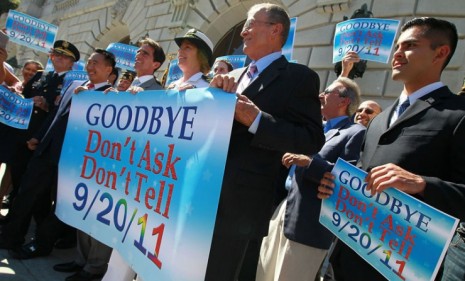The military after 'Don't ask, don't tell': 4 predictions
The ban on gays serving openly in the military is officially history. What changes are in store for the armed forces?

A free daily email with the biggest news stories of the day – and the best features from TheWeek.com
You are now subscribed
Your newsletter sign-up was successful
At 12:01 a.m. Tuesday, the policy preventing gay men and lesbians from serving openly in the military officially ended. The demise of the 18-year-old ban came after a long and bitter fight. Activists pushing to repeal it said the "Don't ask, don't tell" policy deprived soldiers of the very civil rights they were risking their lives to protect. But some politicians and military leaders argued that letting gays serve openly would be a distraction for soldiers. How will the military change now that the debate is over once and for all? Here, four predictions:
1. The military will be more honest and focused
"Gays and straights are already serving together in the military," says Rob Port at Say Anything Blog. Now that this "absurd policy" is finally history, everyone can stop pretending they aren't. "Don't ask, don't tell" wasn't making anybody happy; the only purpose it served was distracting our soldiers from the job of serving our country. "I'm confident that our men and women in uniform can adjust" to the change.
The Week
Escape your echo chamber. Get the facts behind the news, plus analysis from multiple perspectives.

Sign up for The Week's Free Newsletters
From our morning news briefing to a weekly Good News Newsletter, get the best of The Week delivered directly to your inbox.
From our morning news briefing to a weekly Good News Newsletter, get the best of The Week delivered directly to your inbox.
2. The military will be weaker
America's armed forces are in for some "inevitable problems," says Robert Maginnis at Human Events. The Democratic-controlled Congress repealed the ban last year, citing a "politically inspired Pentagon report" that claimed the military would be unfazed. But in a Pentagon survey, 13 percent of soldiers said they would shorten their future service after the ban's repeal, and another 11 percent said they would consider leaving early. "Retention is a critical readiness factor," so our ability to fight wars will suffer.
3. The entire nation will be stronger
Nobody expects the new policy to "go off without a hitch," say C. Dixon Osburn and Michelle Benecke at The Huffington Post. Still, "this is arguably one of the most significant civil rights achievements of our generation." And like desegregation of the military, it will remove excuses for denying people their rights in society at large. That won't just make the military a more accommodating place for patriotic Americans, it will mark a step forward for the nation as a whole.
A free daily email with the biggest news stories of the day – and the best features from TheWeek.com
4. There won't be any major changes
It's great that soldiers no longer have to live with the "constant fear" of getting outed, says an anonymous gay soldier at The New Republic, but "I am in no rush to tell everyone around me about my sexuality." It's still private. The new policy won't really change much in day-to-day military life. Gay soldiers will continue to do our jobs." And the military as a whole is "so used to taking orders and executing" them that the repeal should "be a blip on the radar," nothing more.
-
 American universities are losing ground to their foreign counterparts
American universities are losing ground to their foreign counterpartsThe Explainer While Harvard is still near the top, other colleges have slipped
-
 How to navigate dating apps to find ‘the one’
How to navigate dating apps to find ‘the one’The Week Recommends Put an end to endless swiping and make real romantic connections
-
 Elon Musk’s pivot from Mars to the moon
Elon Musk’s pivot from Mars to the moonIn the Spotlight SpaceX shifts focus with IPO approaching
-
 The billionaires’ wealth tax: a catastrophe for California?
The billionaires’ wealth tax: a catastrophe for California?Talking Point Peter Thiel and Larry Page preparing to change state residency
-
 Bari Weiss’ ‘60 Minutes’ scandal is about more than one report
Bari Weiss’ ‘60 Minutes’ scandal is about more than one reportIN THE SPOTLIGHT By blocking an approved segment on a controversial prison holding US deportees in El Salvador, the editor-in-chief of CBS News has become the main story
-
 Has Zohran Mamdani shown the Democrats how to win again?
Has Zohran Mamdani shown the Democrats how to win again?Today’s Big Question New York City mayoral election touted as victory for left-wing populists but moderate centrist wins elsewhere present more complex path for Democratic Party
-
 Millions turn out for anti-Trump ‘No Kings’ rallies
Millions turn out for anti-Trump ‘No Kings’ ralliesSpeed Read An estimated 7 million people participated, 2 million more than at the first ‘No Kings’ protest in June
-
 Ghislaine Maxwell: angling for a Trump pardon
Ghislaine Maxwell: angling for a Trump pardonTalking Point Convicted sex trafficker's testimony could shed new light on president's links to Jeffrey Epstein
-
 The last words and final moments of 40 presidents
The last words and final moments of 40 presidentsThe Explainer Some are eloquent quotes worthy of the holders of the highest office in the nation, and others... aren't
-
 The JFK files: the truth at last?
The JFK files: the truth at last?In The Spotlight More than 64,000 previously classified documents relating the 1963 assassination of John F. Kennedy have been released by the Trump administration
-
 'Seriously, not literally': how should the world take Donald Trump?
'Seriously, not literally': how should the world take Donald Trump?Today's big question White House rhetoric and reality look likely to become increasingly blurred